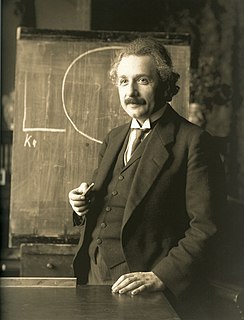
Lubert Stryer is the Mrs. George A. Winzer Professor of Cell Biology, Emeritus, at the Stanford University School of Medicine. His research over more than four decades has been centered on the interplay of light and life. In 2007 he received the National Medal of Science from President Bush at a ceremony at the White House for elucidating the biochemical basis of signal amplification in vision, pioneering the development of high density microarrays for genetic analysis, and authoring the standard undergraduate biochemistry textbook, Biochemistry. It is now in its eighth edition and also edited by Jeremy Berg, John L. Tymoczko and Gregory J. Gatto, Jr.

Rudolf Aebersold is a Swiss biologist, regarded as a pioneer in the fields of proteomics and systems biology. He has primarily researched techniques for measuring proteins in complex samples, in many cases via mass spectrometry. Ruedi Aebersold is a professor of Systems biology at the Institute of Molecular Systems Biology (IMSB) in ETH Zurich. He was one of the founders of the Institute for Systems Biology in Seattle, Washington, where he previously had a research group.
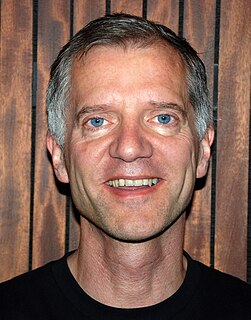
Matthias Mann is a scientist in the area of mass spectrometry and proteomics. Born in Germany he studied mathematics and physics at the University of Göttingen. He received his Ph.D. in 1988 at Yale University where he worked in the group of John Fenn, who was later awarded the Nobel Prize in Chemistry. After a postdoctoral fellowship at the University of Southern Denmark in Odense he became group leader at the European Molecular Biology Laboratory (EMBL) in Heidelberg. Later he went back to Odense as a professor of bioinformatics. Since 2005 he has been a director at the Max Planck Institute of Biochemistry in Munich. In addition, he will also become a principal investigator at the newly founded "Novo Nordisk Foundation Center for Protein Research" in Copenhagen.

David S. Eisenberg is an American biochemist and biophysicist best known for his contributions to structural biology and computational molecular biology. A professor at the University of California, Los Angeles since the early 1970s and director of the UCLA-DOE Institute for Genomics & Proteomics since the early 1990s, as well as a member of the California NanoSystems Institute (CNSI) at UCLA.
The American Society for Biochemistry and Molecular Biology (ASBMB) is a learned society that was founded on December 26, 1906 at a meeting organized by John Jacob Abel. The roots of the society were in the American Physiological Society, which had been formed some 20 years earlier.
Marc R. Wilkins is an Australian scientist who is credited with the defining the concept of the proteome. Wilkins is a Professor in the School of Biotechnology and Biomolecular Sciences at the University of New South Wales, Sydney.
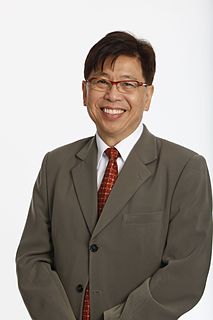
Edison T. Liu, M.D., is the president and CEO of The Jackson Laboratory, and was the president of Human Genome Organization, HUGO from 2007-2013.
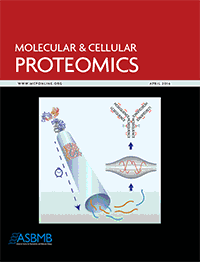
Molecular & Cellular Proteomics is a monthly peer-reviewed scientific journal established in 2002 and published by the American Society for Biochemistry and Molecular Biology. It covers research on structural and functional properties of proteins, especially with regard to development.
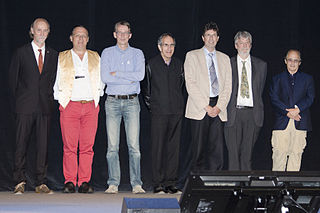
Rolf Apweiler is a director of European Bioinformatics Institute (EBI) part of the European Molecular Biology Laboratory (EMBL) with Ewan Birney.
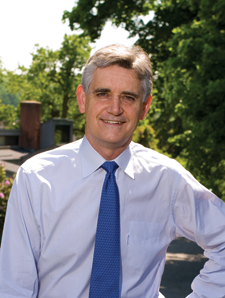
Bruce William Stillman, AO, FAA, FRS is a biochemist and cancer researcher who has served as the Director of Cold Spring Harbor Laboratory (CSHL) since 1994 and President since 2003. He also served as the Director of its NCI-designated Cancer Center for 25 years from 1992 to 2016. During his leadership, CSHL has been ranked as the No. 1 institution in molecular biology and genetics research by Thomson Reuters. Stillman’s research focuses on how chromosomes are duplicated in human cells and in yeast Saccharomyces cerevisiae; the mechanisms that ensure accurate inheritance of genetic material from one generation to the next; and how missteps in this process lead to cancer. For his accomplishments, Stillman has received numerous awards, including the Alfred P. Sloan, Jr. Prize in 2004 and the 2010 Louisa Gross Horwitz Prize, both of which he shared with Thomas J. Kelly of Memorial Sloan-Kettering Cancer Center, as well as the 2019 Canada Gairdner International Award for biomedical research, which he shared with John Diffley.
Emma Whitelaw is an eminent molecular biologist and NHMRC Australia Fellow at the Queensland Institute of Medical Research and is among Australia's leading researchers of epigenetics. Whitelaw was the first to demonstrate epigenetic inheritance in mammals. She now currently works at La Trobe University in Australia.

Roger Sidney Goody is an English biochemist who served as director at the Max Planck Institute for Molecular Physiology in Dortmund from 1993 until 2013. Since 2013 he is Emeritus Director of the institute.
The Australasian Proteomics Society (APS) is a learned society formed in 2004 from the Lorne Proteomics Symposia (LPS) meetings. The APS was expanded to include the Australian Electrophoresis and Proteomics Society. The Lorne Proteomics Symposia meetings can trace their roots to the original Specialist Protein Analysis Workshop (SPAW) founded by Robert L. Moritz and Richard J. Simpson. These meetings began in 1994 as an offshoot of the Lorne Protein Meeting. to address the needs of protein purification and analysis technologies rapidly under development in the 1980s. The founding president and vice president were Simpson and Moritz. The current president is Stuart Cordwell. In 2004, an Australasia-wide committee was formed to fully disseminate the activities of the APS and provide a regional society to include New Zealand and other interested Asian countries to be a focal hub in the Pacific for the Human Proteome Organization. The aims of the APS are to promote and facilitate proteomics research and related topics. The APS acts a liaison body for communication with state and federal government as well as a central point for the coordination of proteome-related programmes and resources. The APS is a member of the Asia Oceania Human Proteome Organization.
Leann Tilley is Professor of Biochemistry and Molecular Biology in the Bio21 Molecular Science and Biotechnology Institute, The University of Melbourne.

The La Trobe Institute for Molecular Science (LIMS) is an Australian institute based at La Trobe University in Melbourne. It contains research groups in life sciences, physical sciences, and applied sciences (pharmacy) and teaches undergraduate and graduate courses in these areas through the School of Molecular Sciences. Established in 2009, the Institute has been led by Professor Andrew Hill since 2017.
Zeng Rong is a Chinese biochemist researching and developing technology for proteomics research. She is currently a professor at the Institute of Biochemistry and Cell Biology at the Shanghai Institutes for Biological Sciences.
Anil Grover is an Indian molecular biologist, professor and the head of the Department of Pant Molecular Biology at the University of Delhi. He also heads the Anil Kumar Lab of the department, serving as the principal investigator. Known for his research in the field of molecular biology of plants, Grover is an elected fellow of all the three major Indian science academies namely the National Academy of Sciences, India, the Indian Academy of Sciences and the Indian National Science Academy as well as the National Academy of Agricultural Sciences. The Department of Biotechnology of the Government of India awarded him the National Bioscience Award for Career Development, one of the highest Indian science awards, for his contributions to biosciences in 2002.
Sir Michael Anthony John Ferguson CBE, FRS, FRSE is a British biochemist and Regius Professor of Life Sciences at the University of Dundee. His research team are based at the School of Life Sciences, University of Dundee.
Anthony William Linnane (1930–2017) was an Australian professor of biochemistry, known for his work on mitochondria.
Marilyn Anderson is an Australian scientist and entrepreneur/businesswoman in the area of biochemistry and plant molecular biology. She is a professor at La Trobe University and co-founded Hexima, an agribiotechnology company, in 1998.
